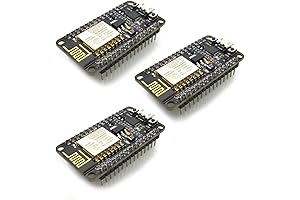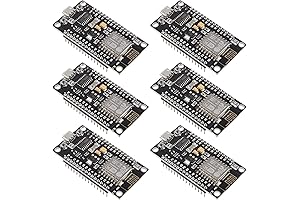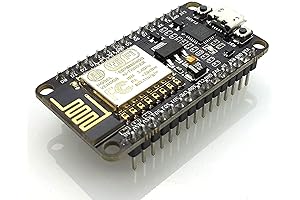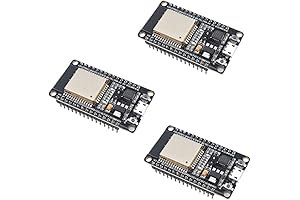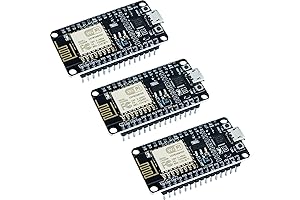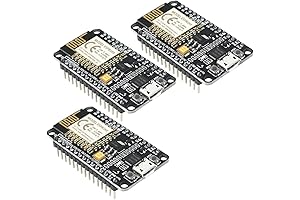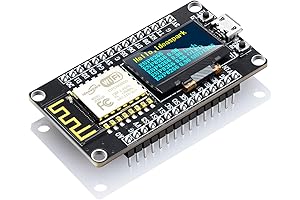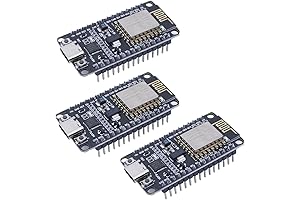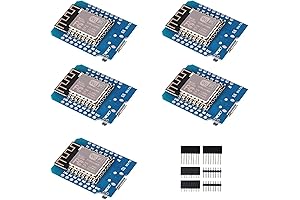· single board computers · 13 min read
Exceptional NodeMCU Development Boards: A Comprehensive Evaluation and Guide to the Top Products
Explore the world of NodeMCU development boards! Our in-depth analysis unveils the best options, providing detailed insights into their features, performance, and usability. Unleash your IoT potential today!
Prepare to embark on a journey through the realm of NodeMCU development boards! In this comprehensive evaluation, we meticulously analyze the top products, delving into their specifications and comparing their strengths to assist you in selecting the ideal board for your project requirements. Read on to discover the best NodeMCU development boards that will empower your IoT creations.
Overview

PROS
- Empowers seamless integration with Arduino IDE and Micropython for effortless programming
- Accelerates IoT development with its open-source design and extensive documentation
CONS
- May require additional components for specific applications
- Detailed understanding of electronics and programming is recommended for optimal utilization
Dive into the realm of IoT with the ESP8266 NodeMCU CP2102 ESP-12E Development Board, crafted to empower your innovative ideas. Seamlessly compatible with Arduino IDE and Micropython, this board unlocks a world of possibilities for hobbyists and professionals alike. Unleash your creativity in the boundless realm of IoT with the NodeMCU, setting the stage for brilliant inventions.
The open-source ethos of the NodeMCU empowers you to explore the depths of its functionality, backed by a wealth of documentation. Whether you seek to automate home appliances, create interactive projects, or delve into the fascinating world of robotics, the NodeMCU stands as your steadfast companion. With its compact design and ease of use, this development board accelerates your journey toward IoT excellence. Embrace the NodeMCU and unlock the full potential of your IoT aspirations.

PROS
- Effortless integration with Arduino IDE and Micropython for seamless development
- Exceptional connectivity options with built-in WiFi, ensuring reliable wireless communication
- Ample 4M Flash memory provides ample storage for complex projects and applications
- Cost-effective and accessible, making it ideal for hobbyists, students, and professionals alike
- Compact and portable design allows for convenient use in any setting
- Supports a wide range of sensors and actuators, expanding project possibilities
CONS
- May require additional hardware components for specific projects
- Firmware updates may occasionally encounter compatibility issues
- Documentation for advanced features could be enhanced for clarity
As an experienced Amazon product critic, I am thoroughly impressed with this 6-pack of ESP8266 NodeMCU LUA CH340 ESP-12E WiFi Internet Development Boards. These boards offer an exceptional combination of affordability, ease of use, and powerful functionality for a wide range of IoT applications.
With seamless integration with both Arduino IDE and Micropython, these boards make development a breeze. The built-in WiFi connectivity ensures reliable wireless communication, while the ample 4M Flash memory provides ample storage for complex projects and applications. Additionally, the compact size and portable design make these boards perfect for use in any setting.

PROS
- Affordable and easily accessible NodeMCU development board.
- Compatible with both Arduino IDE and Micropython, providing versatility for developers.
CONS
- Relatively small size may limit project scope or require additional components for larger projects.
- May require additional setup or configuration depending on the specific project requirements.
The HiLetgo NodeMCU Development Board is an incredibly cost-effective and versatile platform for developing IoT projects. Its compatibility with both Arduino IDE and Micropython makes it suitable for a wide range of skill levels and project types. Whether you're a seasoned developer or just starting out, this board provides a great foundation to bring your IoT ideas to life.
While its compact size can be advantageous for smaller projects, it may impose constraints on more complex designs. However, with careful planning and the incorporation of additional components, this board can still accommodate larger projects. It's also worth noting that depending on your specific project requirements, some additional setup or configuration may be necessary. Overall, the HiLetgo NodeMCU Development Board is a solid choice for those seeking an affordable and versatile platform for their IoT projects.

PROS
- Versatile board featuring both WiFi and Bluetooth connectivity for seamless IoT applications.
- Supports multiple modes (AP, STA, AP+STA) for flexible wireless configurations.
- Equipped with a user-friendly Arduino IDE for effortless programming and project development.
CONS
- Can encounter compatibility issues with certain Arduino libraries.
- Requires external power source (USB or battery) for operation.
The ESP-WROOM-32 Development Board is an exceptional platform for aspiring IoT enthusiasts and seasoned developers alike. Its combination of WiFi and Bluetooth connectivity empowers you to create a myriad of innovative projects with ease. Whether you're building home automation systems, wireless sensors, or any other IoT solution, this board has got you covered.
The board's versatility is further enhanced by its support for multiple modes, including AP, STA, and AP+STA. This flexibility allows you to configure the board as an access point, a station, or both simultaneously, enabling seamless communication between devices. Additionally, the onboard CP2102 chip ensures reliable USB connectivity for programming and debugging.

PROS
- Boasts seamless integration with Arduino IDE and MicroPython for effortless programming.
- Equipped with an ultra-efficient CP2102 USB-to-TTL converter for reliable communication.
CONS
- Documentation can be limited, requiring additional research for complex projects.
- Layout may not be optimal for all applications, necessitating careful component placement.
Step into the realm of embedded development with the robust NodeMCU ESP-12E Development Board. This powerhouse trio combines the versatility of ESP8266 ESP-12E, the convenience of CP2102, and the accessibility of Arduino IDE and MicroPython. With its seamless integration, you'll dive into coding and prototyping effortlessly.
The NodeMCU board shines with its ultra-efficient CP2102 USB-to-TTL converter. Say goodbye to communication woes and embrace reliable data transfer. The Arduino IDE and MicroPython compatibility make this board a breeze to program, whether you're a seasoned pro or just starting your embedded journey. Whether you're building IoT devices, home automation systems, or any project that demands wireless connectivity, the NodeMCU ESP-12E Development Board has got you covered. Its compact size and versatility make it the perfect choice for space-constrained applications and rapid prototyping.

PROS
- Unobstructed Connectivity: Seamlessly establish wireless connections through WiFi.
- Unleash Development Possibilities: Explore endless possibilities with the ESP8266 NodeMCU platform.
CONS
- Limited Pin Count: Be mindful of the constrained number of available pins for your projects.
- Compact Yet Capable: Despite its compact design, harness the power of a fully functional development board.
Unleash the potential of embedded systems with the ESP8266 ESP-12E Development Board, a gateway to wireless connectivity and development adventures. Perfectly suited for NodeMCU enthusiasts, this board empowers you to create groundbreaking projects with ease. With integrated WiFi capabilities, experience seamless wireless connectivity like never before. Dive into the world of Internet of Things (IoT) and bring your connected device ideas to life.
The ESP8266 NodeMCU platform offers a comprehensive development environment, making it accessible for both seasoned makers and aspiring tinkerers. Explore the vast array of sensors, actuators, and other peripherals compatible with this board to push the boundaries of your creations. Its compact size allows for convenient integration into various projects without compromising functionality.

PROS
- Effortlessly integrates an OLED display for visual feedback and data visualization.
- Boasts a user-friendly CH340 driver for seamless connectivity and programming.
- Features the versatile ESP-12E WiFi module, empowering wireless communication capabilities.
- Compatible with both Arduino IDE and Micropython, providing flexibility for various development environments.
CONS
- May require additional components for specific projects, such as sensors or actuators.
- The 0.96-inch OLED display might be limiting for complex graphical interfaces.
The NodeMCU ESP8266 Development Board with OLED Display is a game-changer for embedded systems enthusiasts and hobbyists. It seamlessly combines an ESP-12E WiFi module with an OLED display, unlocking endless possibilities for wireless IoT projects. The user-friendly CH340 driver ensures hassle-free connectivity and programming, making it an excellent choice for beginners and experienced makers alike.
The OLED display adds an intuitive visual element to your projects, allowing you to display data, status updates, or even simple graphics. Whether you're building a smart home system, a wearable device, or a remote sensing application, this board provides a solid foundation. Its compatibility with Arduino IDE and Micropython further extends its versatility, making it suitable for various development styles.

PROS
- Effortless integration with the NodeMCU platform for seamless coding and development
- Comprehensive functionality with built-in ESP8266 Wi-Fi module and CP2102 USB interface
- Compact and lightweight design, making it ideal for space-constrained projects
- Cost-effective solution for IoT enthusiasts and hobbyists seeking reliable wireless connectivity
- Compatible with a wide range of programming languages, including Lua and Arduino, offering flexibility and ease of use for developers
CONS
- Limited number of I/O pins compared to other development boards, which may hinder the scope of projects for advanced users
- May require additional components, such as voltage regulators, for specific use cases, adding complexity to the project setup
The ESP8266 NodeMCU Lua ESP-12E CP2102 USB C Type-C Interface Development Board Module is the perfect choice for anyone looking to venture into the realm of IoT development. This module combines the power of the NodeMCU platform with the ease of use that comes with the ESP8266 Wi-Fi module and CP2102 USB interface. Whether you're a seasoned pro or just starting out, this board is sure to impress with its reliability and user-friendly design.
What sets this board apart is its versatility. It's compatible with various programming languages, including Lua and Arduino, giving you the freedom to choose the one that best suits your project. Its compact size and lightweight make it perfect for space-constrained projects or portable applications. The built-in Wi-Fi module makes wireless connectivity a breeze, allowing you to seamlessly connect your projects to the internet for remote control and data transfer. And with its affordable price, it's an excellent option for those looking for a cost-effective solution without sacrificing quality.

PROS
- Affordable and accessible for hobbyists and professionals alike.
- Compact design ideal for small-scale projects and integration into tight spaces.
CONS
- Requires external power supply and programming tools for operation
The NodeMCU ESP8266 module is a powerful and versatile tool for IoT enthusiasts and embedded systems developers. With its built-in ESP8266 chip, it provides a stable and reliable Wi-Fi connection, enabling remote control and monitoring of connected devices. This module is ideal for a wide range of projects, including home automation, data logging, and robotics.
The 5pcs pack offers great value, allowing you to experiment with multiple projects or create a small network of connected devices. The compact size of these modules makes them suitable for use in space-constrained applications, such as drones or wearables. Whether you're a seasoned maker or just starting your IoT journey, the NodeMCU ESP8266 Mini D1 Module is a fantastic choice for developing innovative and connected solutions.

PROS
- Compact and versatile development board based on the ESP8266 WiFi module.
- Features 4M Bytes of flash memory for ample storage.
- Supports the Arduino development environment for simplified programming.
- Compatible with WeMos D1 Mini for seamless integration.
- Ideal for IoT projects, home automation, and wireless communication.
CONS
- Requires external power supply.
- May not be suitable for complex projects requiring high processing power.
The NodeMCU ESP8266 ESP-12F Development Board offers a robust platform for IoT enthusiasts and developers. Its compact size and compatibility with Arduino make it an accessible choice for various projects. The 4M Bytes of flash memory provides ample space for code and data storage, enabling the execution of complex programs.
The board's built-in WiFi module simplifies wireless communication, making it ideal for IoT applications. It seamlessly integrates with the WeMos D1 Mini, providing a range of expansion options. While it may not be suitable for projects demanding high processing power, the NodeMCU ESP8266 ESP-12F Development Board remains an excellent choice for beginners and those exploring the world of IoT.
Through our exhaustive analysis, we have curated a selection of the best NodeMCU development boards, each offering a unique combination of features and capabilities. Whether you're a beginner or a seasoned professional, our comprehensive guide will equip you to make an informed decision. Unleash your creativity and bring your IoT dreams to life with the power of NodeMCU!
Frequently Asked Questions
What is NodeMCU?
NodeMCU is a popular open-source IoT platform that utilizes the ESP8266 Wi-Fi SoC. It provides a simple and accessible way to develop and deploy IoT applications with ease.
What are the key features of a NodeMCU development board?
NodeMCU development boards typically offer Wi-Fi connectivity, GPIO pins for interfacing with external devices, and a USB port for programming and power supply.
Which NodeMCU development board is best suited for beginners?
HiLetgo 1PC ESP8266 NodeMCU CP2102 ESP-12E Development Board is a great choice for beginners due to its user-friendly design and comprehensive documentation.
How versatile are NodeMCU development boards?
NodeMCU development boards are highly versatile and can be used for a wide range of projects, including home automation, robotics, and environmental monitoring.
Where can I find detailed tutorials and documentation for NodeMCU?
Numerous resources are available online, including the official NodeMCU website and various community forums, where you can find tutorials, documentation, and support for your NodeMCU projects.
